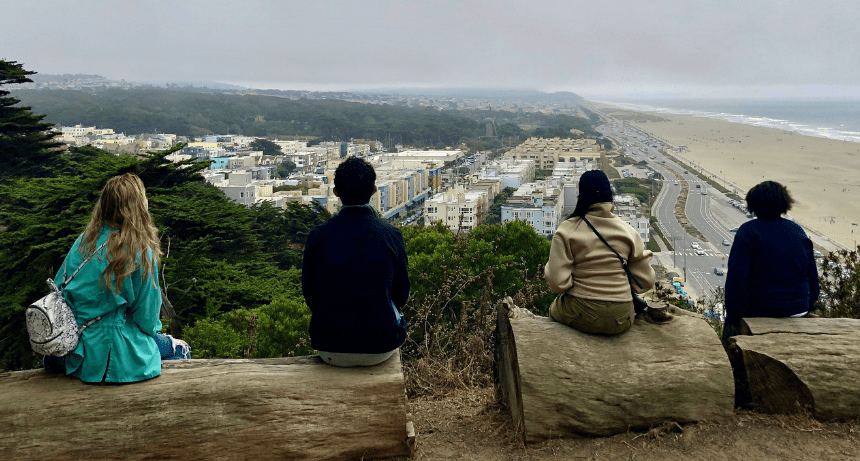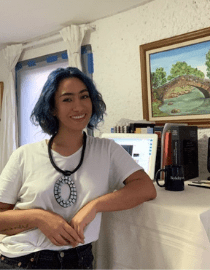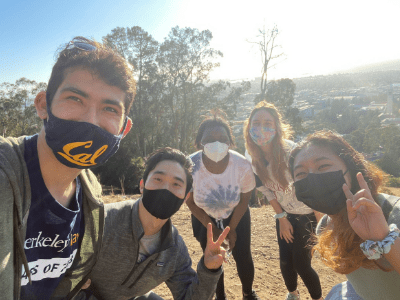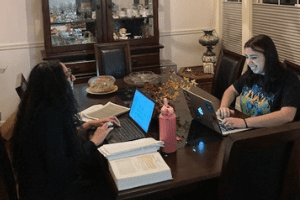
By Gwyneth K. Shaw
In any other year, the members of Berkeley Law’s class of 2023 would have spent the fall months getting to know one another all over the school — chatting after class, huddling in the library, gathering in the sunshine over lattes at Café Zeb.
Instead, they’ve navigated the academic and social sides of their 1L year largely digitally. Many students chose not to move to the Bay Area while the UC Berkeley campus is shuttered, and even those who are local are subject to the restrictions on gathering aimed at slowing the spread of COVID-19.
Students admit it’s a challenge.
“I do feel that I’m missing out greatly on the Berkeley Law community. I also feel that I’m missing out on an indescribable ‘atmosphere’ of law school: Sitting in a large room with 100 other students, laughing in a study room with friends, chatting with a professor after class,” says Blaine Schmidt ’23.
“Remote instruction, by its very nature, makes impossible some beautiful components of everyday, in-person interactions — befriending the person seated beside you, speaking with and seeing others in real-time without lag, moving smoothly between conversations with different people. The list goes on.”
But as the spring semester gets underway, the students remain undaunted — finding the small consolations that keep them going, from a giggle-inducing GroupMe chat string to a Zoom chat pat on the back after a salient in-class comment.
1Ls are divvied into modules, or “mods,” of roughly 30 students, as a way to foster relationships. The groupings track their fall classes, so that everyone in a mod shares the same classes and professors. When orientation began in August, getting to know one another started with mod members, and immediately the group chats began.
Zoom chats are a big tool, too, although it’s back to GroupMe for courses where the professor has disabled that function. Group texts are a place for all kinds of interactions, from quick jokes to deep connections.
Despite the digital hurdles, students say they’re building something special.

“I’ve been so taken aback in a positive way at how generous people have been with each other,” says Ximena Velazquez-Arenas, one of the 1L class representatives to the Student Association at Berkeley Law (SABL). “The fact that we haven’t by and large met in person and people are still so willing to share, whether it’s offering outlines or answering questions or hyping one another up when you’re on call, it’s just been so encouraging in a way that you can revisit because it’s preserved in a chat or in a text.
“I’ve been really blown away with the level of support and warmth that is still palpable just with us being so far apart.”
Yara Slaton, another SABL representative, agreed. When her computer melted down, classmates leaped to share notes and anything else she needed.
“It’s like the opposite of competition. It’s just community,” she says. “I’m floored by that, and how people are still able to connect on a human level despite these physical barriers.”
‘The gang’s all here’
Velazquez-Arenas is living with her family in Mexico City, where she’s carved out a small workspace in a bedroom nook. Slaton shares a house in Boise, Idaho, with her mother and 17-year-old daughter, taking classes at the dining room table. Wi-Fi bandwidth is a hot commodity.
“I’m grateful for the extra time with my family, but I would 1000% rather be there,” Slaton says. “I feel like I’m doing all the hard parts of law school but not the fun parts of being there and experiencing it.”
Velazquez-Arenas says when she asked her group on a chat how everyone was doing, someone responded with a meme featuring SpongeBob SquarePants with faces drawn on his fingers and the phrase “The gang’s all here.”
“There’s a lot of wit to the class, and I think that a lot of the bonding comes from the shared experience of solitude, which is beautiful and dark and complicated,” she says. “Our group chat is lit.”
Students living in Berkeley say it’s also isolating, especially given the restrictions on gathering throughout the Bay Area and California.

“The majority of my day is spent within the approximately 300 square feet of my apartment: attending class, eating, socializing, studying. It gets claustrophobic, and it gets lonely,” Schmidt says.
After the late-summer fires died down, though, he has been able to hike, picnic, and get takeout meals with other students, which has helped.
Sylvia Woodmansee, who has lived in the Bay Area for more than five years, says making one-on-one connections with other students is difficult, but doable. In-person meetings are nice but fraught with the same concerns as any live gathering are for everyone coping with the pandemic, particularly as the coronavirus has raged in the state in recent weeks.
Woodmansee joined a journal and two Student-Initiated Legal Services Projects, known as SLPS, and will be on an alternative service project during the spring semester. That’s made a big difference, she says.
“I felt that everyone on campus was putting in a great deal of effort to build connections virtually and I think those efforts were successful. I thought the professors did an incredible job with remote instruction; I’m sure it can’t have been easy to teach classes virtually,” Woodmansee says. “I do feel that I was able to build some friendships and some sense of community even in the virtual space, through my mod and through journal and SLP work in particular.”
She credits Zoom classes for making it easier to see her professors, and for making her feel more comfortable speaking up in class than she might have in person. Office hours are more accessible, too, Woodmansee says, since dropping in to chat with a professor doesn’t require anything other than clicking a link.
She also lauds the one-unit mini courses just for first-year students, which capped enrollment at 10 and afforded the chance for close interactions with other students and faculty.
Living in UC Berkeley student housing is one of the ways Nicki Guivatchian is getting to know her fellow students. She joined the Berkeley Journal of International Law and the Middle Eastern and North African Law Students Association (MENALSA). Guivatchian and others praise older students for working hard to seek out 1Ls and offer their help with everything from studying to the summer job hunt.
“It has been very important to me to meet my classmates because the collegial community at Berkeley is what drew me to the school in the first place,” she says. “I have met some of the most interesting people through my involvement with journals and particularly as treasurer of MENALSA. I was initially overwhelmed with the number of ways to get involved with the community and I look forward to meeting everybody in person next fall.”
For now, virtual gatherings will have to do, and students are endlessly creative, planning scavenger hunts, marathon sessions of the online game “Among Us,” and trivia nights — one featuring questions about Professor Amanda Tyler, who joined in the fun — to keep everyone engaged. Students say it’s been good to have myriad options on the calendar at the beginning of the week, even if by Friday many feel exhausted by Zoom.
“What makes it extra hard is normally connecting with other humans is supposed to fill your cup, but when you have to do it on Zoom and Zoom is already depleting, that’s another barrier,” Slaton says.
Generosity amid uncertainty
Of course, these students have no other law school experience to compare. But they do see the benefits of the renowned Berkeley Law community among older students.

At first, Slaton says, she could feel the difference in virtual spaces with 2Ls and 3Ls, who had gotten to know each other in person.
“There was a chemistry and a warmth there that we didn’t have,” she says. “We’re all trying to make up for this, but when you haven’t built authentic in-person connections, sometimes it makes difficult conversations more difficult, especially when it involves marginalized groups. That can be very difficult to navigate when you’re not in person.”
The shared experience of going through first-semester finals has changed that dynamic, Slaton says, knitting the class more tightly together.
Velazquez-Arenas misses the ability to arch an eyebrow at a friend during class, and follow up with a quick conversation later, especially during a discussion that might deal with tricky issues. The down time between classes, or on the weekends, can’t quite be replaced with texts or Zoom socials.
“It’s just really easy to feel that depression hanging over you when you don’t have a routine break. There’s just more time in your isolation,” Velazquez-Arenas says. “I think I’ve met a lot more people because the reach of digital messaging is just so much broader than what you might have time for in terms of in-person interactions, but at the same time that compromises the depth of the interaction.”
One thing that Velazquez-Arenas values about this time is the opportunity to reconnect with her family. She had been living in Washington for several years, but when the pandemic hit, she returned to her childhood home.
“I feel really grateful to be able to be with them,” she says. “We just don’t see each other very much because of immigration reasons — maybe once every year or two years — so this is completely different. And in many ways, I think it’s going to be hard to make that transition and go back to that way of seeing each other.
“Certainly, that’s something that’s on my mind, and there are many other students impacted by circumstances like this, not just at Berkeley. When this is all over, I hope we can keep that in mind.”